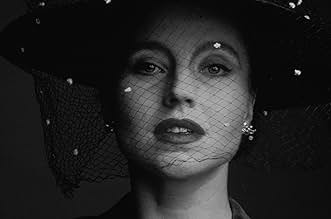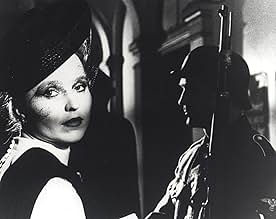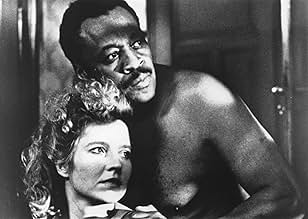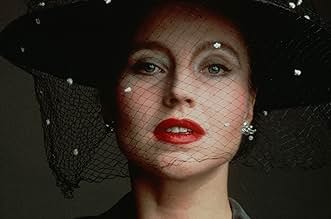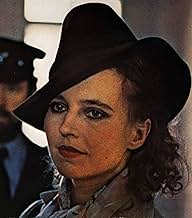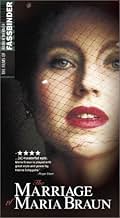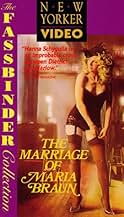Maria marries Hermann Braun in the last days of World War II, only for him to go missing in the war. Alone, Maria puts to use her beauty and ambition in order to find prosperity during Germa... Read allMaria marries Hermann Braun in the last days of World War II, only for him to go missing in the war. Alone, Maria puts to use her beauty and ambition in order to find prosperity during Germany's "economic miracle" of the 1950s.Maria marries Hermann Braun in the last days of World War II, only for him to go missing in the war. Alone, Maria puts to use her beauty and ambition in order to find prosperity during Germany's "economic miracle" of the 1950s.
- Awards
- 13 wins & 7 nominations total
- Bill
- (as George Byrd)
- Hans Wetzel
- (as Günther Lamprecht)
Featured reviews
The story in a nutshell is of almost war widow Maria Braun rebuilding her life in post war Germany & rising high on the corporate ladder till she realises that she has given too much of herself for the climb to enjoy the cause she was climbing for.
Standing by itself, I still think this movie will appeal either to European baby boomers or serious students of Fasbinder. The narrative is straight forward & the final TV audio track is a brilliant touch. Hanna Schygulla as Maria gives yet another great performance for Fasbinder.
This is a Modern Classic, one of the very best films to come out of the 1970s/80s German Cinema. Much stronger than "Veronica Foss" and in the league of "Das Boot", "The Marriage of Maria Braun" is a product of Modern German Dramatic Cinema's golden age. No sugar coating, just pure, unadulterated truth as seen through the rear-view mirror of people who have lived the horrors and survived into new tomorrows. A true gem of a film!
Without wishing to give too much away, it tells the tale of a woman who, seeing the desolate landscape that Germany was in 1945, determines to build herself a comfortable life and, as she does so, she becomes one of many women in Germany rebuilding the nation. This was a time, historically, when the women were a greater driving force in the social and economic rebuilding of the nation than were the men (who were both lacking in credibility following the horrors and the mess of the years past, and somewhat dazed by what the nation had just been through).
As she builds that life (and in so doing helps to rebuild the nation), however, she finds that she may have sacrificed too much.
It is a movie worth watching in order to gain some understanding of what life was like in Germany from 1945 to roughly 1970. Rainer Fassbinder makes use of images in places which show the transition of German society from broken ruins to economic superpower, the changing status of women in German society over that time period, the changing attitudes both within Germany and from outside toward Germany, and the sacrifices that women were prepared to make in order to build the Germany that they ultimately did. It also asks, though, if the single-minded pursuit of rebuilding the nation economically and materially did not take too much out of the nation and the people in other areas.
I enjoyed the movie, and am happy to recommend it.
It seems to me that rather than being a cynical portrayal of those difficult years, it is more truthful and revelatory in a deep way. I imagine that no one other than those who lived then can begin to tell the story, which is why Fassbinder has tried on our behalf -- to try to convey to us the angst, the frustrations, the sadness, the insanity, the querulousness, the fragile hope of that era.
I find the story very sad, of course, because in my early-21st century psyche I'm more tuned into the love story than I am the tale of the sociology and social psychology of an era that occurred when I was very young. It seems to me that if one views the characters as representatives of some of the major "world views" obtaining during the reconstruction period, one sees a few of the many different human reactions there can be to such an experience: Many feel burned out and can't feel hope any longer; others, like Maria, feel there is at least money and position to be gained under the new dispensation; some simply don't care; others try to feed off the experience without contributing; and so on and so forth.
It also occurred to me that, at age 60, I may be in a position to appreciate this film more, and certainly to be more understanding of and sympathetic with the characters/types portrayed. I found each of them to have an important story to tell, whether it was a "good" story or not. And the character of the Black US Army Sergeant, while tragic at the end, was itself an essay in human relations that has to embarrass most Americans -- the fleeting moments when he and Maria found joy and pleasant times together were just wonderful to behold, and an indictment of our sad history in that regard.
View it and see what you think!
Did you know
- TriviaInspired by "Mutter Courage und ihre Kinder" (1938/39), a play by Bertolt Brecht, and Liliane (1933).
- GoofsAt the end of the cut of the two kids blowing up the firecrackers, they start laughing but no sound is heard. The sound of laughter is heard on the next cut after they get yelled at by the man scavenging for wood.
- Quotes
Maria Braun: I'm a master of deceit: a capitalist tool by day, and by night an agent of the proletarian masses - the Mata Hari of the Economic Miracle.
- Crazy creditsAt the very end of the credits the following persons are 'credited' by their picture: Konrad Adenauer, Ludwig Erhard, Kurt Georg Kiesinger and Helmut Schmidt and a disconnected phone line can be heard.
- SoundtracksIn The Mood
Written by Wingy Manone, Andy Razaf and Joe Garland
- How long is The Marriage of Maria Braun?Powered by Alexa
Details
- Release date
- Country of origin
- Official sites
- Languages
- Also known as
- The Marriage of Maria Braun
- Filming locations
- Production companies
- See more company credits at IMDbPro
Box office
- Budget
- DEM 1,975,000 (estimated)
- Gross US & Canada
- $8,144
- Opening weekend US & Canada
- $11,623
- Feb 16, 2003
- Gross worldwide
- $11,869


